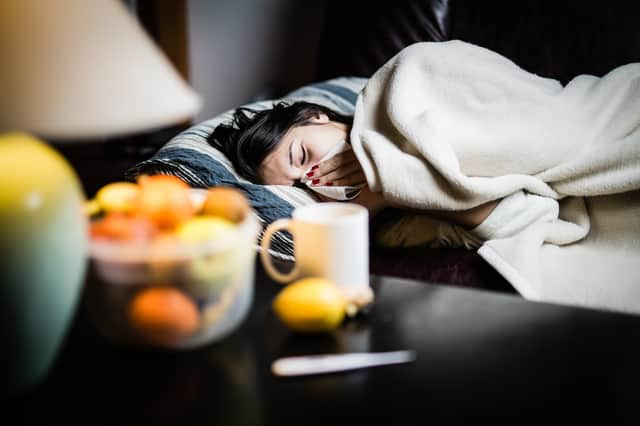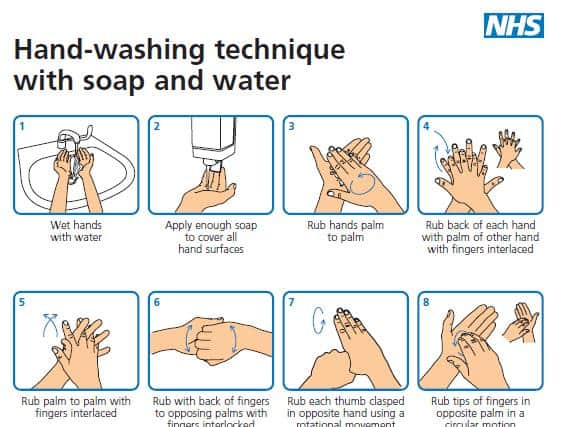Up to one fifth of UK workers are expected to be off at same time due to coronavirus


This afternoon, the UK government has finally announced its predictions for the current outbreak of Covid-19 in the United Kingdom
The Action Plan describes how emergency services, schools, workforce, and military will all be affected by the continuing spread of the coronavirus.
Advertisement
Hide AdAdvertisement
Hide AdThe Government expects that one fifth of the total UK working population may have to self-isolate, or be off sick, in the event that the disease spreads further. This will place extreme pressure on emergency services, so fire and police teams will only call out to the most serious incidents, with the military potentially assisting the public with emergency needs.


At a conference, Prime Minister Boris Johnson said the government was committed to doing "everything possible" to "prepare for all eventualities".
"That's why keeping the country safe is the government's overriding priority, and our plan means we are committed to doing everything possible, based on the advice of our world-leading scientific experts, to prepare for all eventualities," Mr Johnson added.
School closures and self-isolation
Elderly people will be discouraged from attending social events and schools could close in the event of a larger outbreak. Schools closures are often the first step to fight an outbreak, as children are more likely to spread viruses and then bring them home to others.
Advertisement
Hide AdAdvertisement
Hide AdHowever, we are currently at the 'contain' phase of this outbreak. This means that those showing symptoms or who have travelled from currently infected areas across the world are being told to self-isolate.
People can be symptomless with Covid-19 for up to 14 days, but are still able to spread the contagion. Self-isolation is one of the best ways to deny the virus an opportunity to move from person to person.
Hand washing technique (Image: NHS)
The government and health authorities are highlighting the use of hand soap and water as a way to protect yourself from the virus. Hand sanitisers also work, but washing your hands thoroughly for 30 seconds with normal soap and water is the best way to protect yourself.
Make sure hands are completely dry from washing, including with sanitiser.
Waves of outbreak
Advertisement
Hide AdAdvertisement
Hide AdMost people will suffer mild to moderate symptoms if they contract the virus. These will be similar to the flu. But a minority will require hospital care, with an even smaller proportion dying from the disease.
Elderly groups are the most vulnerable to the disease as young children get infected by suffer less serious symptoms. The government has warned that Covid-19 could outbreak in multiple waves.
The worst case scenario is based on 80 per cent of the population contracting Covid-19.
If you have the symptoms of coronavirus please contact your GP or called NHS 111. You can also visit 111.nhs.uk for up to date information and advice regarding the current outbreak.
Coronavirus: the facts
What is coronavirus?
Advertisement
Hide AdAdvertisement
Hide AdCOVID-19 is a respiratory illness that can affect lungs and airways. It is caused by a virus called coronavirus.
What caused coronavirus?
The outbreak started in Wuhan in China in December 2019 and it is thought that the virus, like others of its kind, has come from animals.
How is it spread?
As this is such a new illness, experts still aren’t sure how it is spread. But.similar viruses are spread in cough droplets. Therefore covering your nose and mouth when sneezing and coughing, and disposing of used tissues straight away is advised. Viruses like coronavirus cannot live outside the body for very long.
What are the symptoms?
The NHS states that the symptoms are: a dry cough, high temperature and shortness of breath - but these symptoms do not necessarily mean you have the illness. Look out for flu-like symptoms, such as aches and pains, nasal congestion, runny nose and a sore throat. It’s important to remember that some people may become infected but won’t develop any symptoms or feel unwell.
What precautions can be taken?
Advertisement
Hide AdAdvertisement
Hide AdWashing your hands with soap and water thoroughly. The NHS also advises to cover your mouth and nose with a tissue or your sleeve (not your hands) when you cough or sneeze; put used tissues in the bin immediately and try to avoid close contact with people who are unwell. Also avoiding touching eyes, nose and mouth unless your hands are clean.
Should I avoid public places?
Most people who feel well can continue to go to work, school and public places and should only stay at home and self isolate if advised by a medical professional or the coronavirus service.
What should I do if I feel unwell?
Don’t go to your GP but instead call NHS 111 or look online at the coronavirus service that can tell you if you need medical help and what to do next.
When to call NHS 111
NHS 111 should be used if you feel unwell with coronavirus symptoms, have been in a country with a high risk of coronavirus in the last 14 days or if you have been in close contact with someone with the virus.
Sources: World Health Organisation and NHS